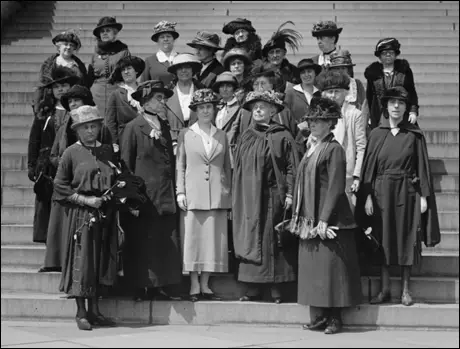Women's Peace Crusade
Two days after the British government declared war on Germany on 4th August 1914, Millicent Fawcett announced that the NUWSS was suspending all political activity until the conflict was over. Although the NUWSS supported the war effort, it did not become involved in persuading young men to join the armed forces. Despite pressure from members of the NUWSS, Fawcett refused to argue against the war. Her biographer, Ray Strachey, argued: "She stood like a rock in their path, opposing herself with all the great weight of her personal popularity and prestige to their use of the machinery and name of the union."
The leadership of the WSPU began negotiating with the British government. On the 10th August the government announced it was releasing all suffragettes from prison. In return, the WSPU agreed to end their militant activities and help the war effort.
Emmeline Pankhurst announced that all militants had to "fight for their country as they fought for the vote." Ethel Smyth pointed out in her autobiography, Female Pipings for Eden (1933): "Mrs Pankhurst declared that it was now a question of Votes for Women, but of having any country left to vote in. The Suffrage ship was put out of commission for the duration of the war, and the militants began to tackle the common task."

Annie Kenney reported that orders came from Christabel Pankhurst: "The Militants, when the prisoners are released, will fight for their country as they have fought for the Vote." Kenney later wrote: "Mrs. Pankhurst, who was in Paris with Christabel, returned and started a recruiting campaign among the men in the country. This autocratic move was not understood or appreciated by many of our members. They were quite prepared to receive instructions about the Vote, but they were not going to be told what they were to do in a world war.
After receiving a £2,000 grant from the government, the WSPU organised a demonstration in London. Members carried banners with slogans such as "We Demand the Right to Serve", "For Men Must Fight and Women Must work" and "Let None Be Kaiser's Cat's Paws". At the meeting, attended by 30,000 people, Emmeline Pankhurst called on trade unions to let women work in those industries traditionally dominated by men.
Most members of the Women's Freedom League, were pacifists, and so they become involved in the British Army's recruitment campaign. The WFL also disagreed with the decision of the NUWSS and WSPU to call off the women's suffrage campaign while the war was on. Leaders of the WFL did not believe that the British government did not do enough to bring an end to the war and in 1915 eastablished the Women's Peace Council for a negotiated peace. Members included Charlotte Despard, Selina Cooper, Margaret Bondfield, Ethel Snowden, Katherine Glasier, Helen Crawfurd, Eva Gore-Booth, Esther Roper, Teresa Billington-Greig, Elizabeth How-Martyn, Dora Marsden, Helena Normanton, Margaret Nevinson, Hanna Sheehy-Skeffington and Mary Barbour.
Primary Sources
(1) Christabel Pankhurst, Unshackled (1959)
War was the only course for our country to take. This was national militancy. As Suffragettes we could not be pacifists at any price. Mother and I declared support of our country. We declared an armistice with the Government and suspended militancy for the duration of the war. We offered our service to the country and called upon all members to do likewise. As Mother said, "What would be the good of a vote without a country to vote in!". Mother seemed for the time to dismiss her ill-health in her ardour for the national cause. She spoke to Servicemen on the war front and to Servicewomen on the home front. She called for wartime military conscription for men, believing that this was democratic and equitable, and that it would enable a more ordered and effective use of the nation's man power.
(2) In 1914 the Women's Freedom League refused the call off its campaign for women's suffrage. Charlotte Despard, the leader of the organization was a pacifist who refused to become involved in the war effort. In 1916 she made a speech explaining her views.
The great discovery of the war is that the Government can force upon the capitalistic world the superlative claims of the common cause… The Board of Education has concluded that one in six childhood was so physically and mentally defective as to be unable to derive reasonable benefit from the education, which the State provides… My message to the government is "take over the milk as you have taken over the munitions".
(3) Margaret Bondfield was opposed to the British involvement in the First World War. In March 1917 she faced a hostile crowd at a meeting of the Women's Peace Crusade arranged by Selina Cooper in Nelson.
I know there is not one member of this howling crows that would willingly send their men-folk to an unnecessary death, but that is what you are doing by your attitude… Russia has shown us the way out, and has asked the people of this country to take our stand on the side of democracy and peace… The people who are asking us to save our children today because there is a war on are the people who have doomed us to live under conditions which cause our babies to die.
(4) Sheila Rowbotham, A Century of Women- The History of Women in Britain and the United States (2000)
In the Summer of 1917, the Women's Peace Crusade (WPC) was formed with Helen Crawfurd as honorary secretary. Groups spread across the country, campaigning in working-class communities. Some like the ILP-er and suffrage campaigner Florence Exten-Hann, the Glaswegian trade unionist and socialist feminist Jessie Stephen, and the radical suffragist Selina Cooper from Nelson ILP were part of this grass-roots anti-war movement which retained a strong commitment to democracy and social reform.

